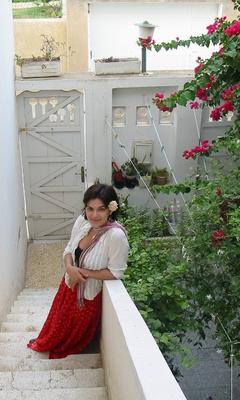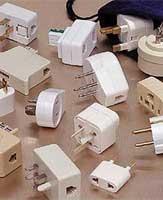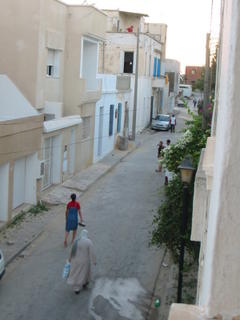The neighborhood we live in is somewhat of a ritzy suburb by Tunisian standards, but it’s nice to come home to a peaceful and semi-quiet place. I say semi-quiet because Tunisians beach-goers are still partying in the streets at 2am every night. Everyone takes a long nap during the hottest part of the afternoon, but it’s still not clear to me how people manage to answer the 4:45am call to prayer which comes from the local muzzein, which, fortunately, I have no trouble sleeping through.
The sun shines from about 5:30am to about 9pm, and it’s in those early nighttime hours that there’s the most community life… people come out to visit the cafes and shisha bars and do their grocery shopping. My roommates and I go out around this time to grab a cheap dinner at local kiosks, and buy the fresh eggs, bread, croissants, olives, cheese, and figs which form the staple of our diet here. In the shopping area of town there is a fruit shop, and a honey shop, and a few butcheries, and a bakery, and several corner store, and my favorite dry goods store which sells everything from enormous loofah sponges, to dry clay (Tunisian shampoo), to whole wheat with the chaff still on, to exotic spices measured out by the gram on old-fashioned scales.

We had a great Arab cultural moment the other evening when Adam and I were out getting groceries. There is a man who stands on the corner across the street from the dry goods store, selling traditional hair adornments made out of dozens of tiny jasmine flowers tied together. Women (and sometimes men) wear these behind the ear, and they smell wonderful. He is probably in his sixties, and dresses up for his job in a traditional red chechiche hat and vest, and is just very cute. So a few days before I had bought a flower from this guy (actually the one I am wearing in the picture) and Adam and I had had a conversation with him.
When he saw us again shopping yesterday, he came over to say hi to us. He wanders over, and just slips his hand into Adam’s and begins to ask him how we’re doing and make small talk. Now, it is actually an very normal thing in Arab culture for male friends to hold hands on the street, but I turned around from buying eggs to see my six-foot-tall very-American friend holding hands with an old man in a chechiche hat and just about peed my pants. I wish I had a picture of it!
Overall, Tunisians have been very friendly to us. People smile at us, strangers are happy to help us with our Arabic, and every barista, shopkeeper, taxi-driver, and ticket-person goes to great lengths to make sure we get an Arabic language lesson along with our coffee, gum, taxi ride, or train ticket. They think it’s sweet that foreigners are trying to learn their language, and the reputation of the Bourguiba Institute precedes us.
However, there’s also a little bit of overwhelming attention as foreigners. We stand out so much, and are such an oddity culturally. People do a lot of staring, random strangers call to us on the street with “touriste, touriste,” and both the men and women get approached by strangers and peppered with odd questions. It’s quite weird to people here that five young people not married to each other would live in an apartment and travel together. Young men in particular are very forward and any glance in their general direction seems to be interpreted as a sign of potential interest, likely to provoke a waggling of eyebrows or a huskily whispered “c’est belle!”
 Significantly, I finally found it the first day that I decided to go off on my own rather than sticking close to my group of fellow Americans. I had walked around enough to figure out that plenty of Tunisian women walk around downtown on their own, and I’m not going to attract any more attention as a single women than in a gaggle of foreigners. So I told the other kids I’d meet them at home, did my thing.
Significantly, I finally found it the first day that I decided to go off on my own rather than sticking close to my group of fellow Americans. I had walked around enough to figure out that plenty of Tunisian women walk around downtown on their own, and I’m not going to attract any more attention as a single women than in a gaggle of foreigners. So I told the other kids I’d meet them at home, did my thing.



